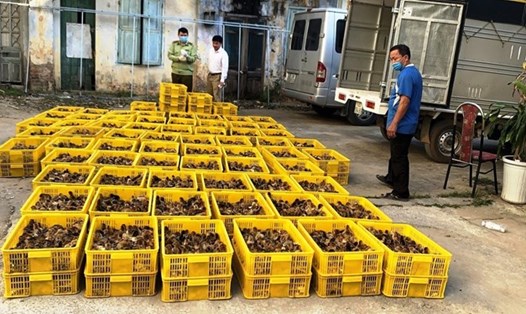H hospitalized with sleeping on the rooster, confused speech, and mild neck awkwardness
On the evening of April 18, the Ho Chi Minh City Department of Health said that the unit had just issued a quick report to the Ministry of Health on the case of female patient L.B.A (8 years old, Tay Ninh) with a diagnosis of encephalitis due to avian influenza H5N1.
Previously, on April 11, the child had a fever, headache, and vomiting many times. The child was admitted to a local hospital for 2 days of treatment but his condition did not improve. On April 13, the child was transferred to Children's Hospital 1 with a state of sleepiness, confusion, and a slight shyness at the time of admission. The child was diagnosed with encephalitis.
Children's Hospital 1 has taken samples of the brain and respiratory epidemic and sent them to the Testing Department of the Hospital for Tropical Diseases. On April 17, the PCR test result of the cerebrovascular disease was positive for influenza A/H5, the PCR test of respiratory diseases negative for influenza.
Children's Hospital 1 continues to send samples to the Pasteur Institute in Ho Chi Minh City. On April 18, the test result was positive for influenza A/H5N1 on a sample of bone marrow epidemic, negative for influenza virus on a sample of phlegm. The Pasteur Institute of Ho Chi Minh City has sent a report to the Department of Prevention of the Ministry of Health.
Currently, the patient is being treated in isolation at the Department of Resuscitation and Infectious Diseases of Children's Hospital 1 in a state of steady breathing according to a ventilator, opening the eye naturally, fever of 38.5 degrees Celsius, and temporary stable vital signs.
Rare case
As soon as the preliminary test results were available, the Department of Health directed the Ho Chi Minh City Center for Disease Control to coordinate with Children's Hospital 1 and the Tay Ninh Provincial Center for Disease Control to conduct an epidemiological investigation and handle the outbreak according to regulations.
Initial information recorded that the child had contact with a mass death of chicken at her grandmother's house 2 weeks ago. The patient is the second child in the family, with a history of congenital heart disease, and underwent surgery at Children's Hospital 1 at the age of 2 months.
According to infectious experts, this is a rare case, in which avian influenza A/H5N1 virus damages the central nervous system and does not attack the respiratory tract.
Normally, avian influenza A/H5N1 virus causes an epidemic in poultry and chickens. People are infected with the virus when in close contact with infected poultry that died. The main manifestation of avian influenza infection is severe pneumonia (ARDS-level respiratory arrest syndrome) with a mortality rate of over 50%. Fortunately, up to now, the A/H5N1 influenza virus has not been transmitted from person to person.
The case of encephalitis caused by influenza H5N1 has been recorded in world medicine. In Dong Thap, during the outbreak of avian influenza H5N1 in humans in 2004, a group of experts from the University of Oxford Clinical Research Unit (OUCRU) in collaboration with the Hospital for Tropical Diseases and Children's Hospital 1 discovered the influenza A/H5N1 virus in the melasma epidemic of 2 children with symptoms of severe diarrhea, coma seizures and then died, without signs of disease in the respiratory tract.
The Department of Health directs Children's Hospital 1 to actively treat children's patients and strictly comply with infection prevention regulations. At the same time, continue to coordinate with infectious experts from the Hospital for Tropical Diseases and OUCRU to conduct in-depth research and learn about this special case.
To proactively prevent and control the A/H5N1 influenza epidemic from poultry to humans, the Ho Chi Minh City Department of Health recommends that people take good measures:
- Do not eat poultry, sick, dead and unknown poultry products.
- Limit contact, slaughter, and eating of wild animals, especially birds.
- Do not slaughter, transport, or buy and sell poultry and poultry products of unknown origin.
- When discovering sick or dead poultry, absolutely do not slaughter or use them but must immediately notify local authorities and veterinary units in the area.
- Eat cooked, drink cooked; wash your hands with soap before eating.
- When there are signs of flu such as fever, cough, chest pain, and shortness of breath related to poultry, you must immediately go to a medical facility.











